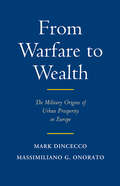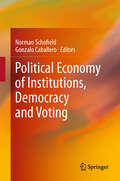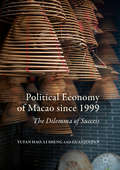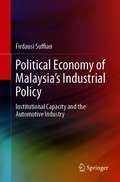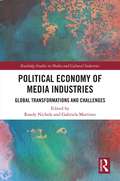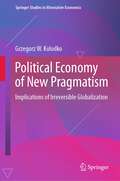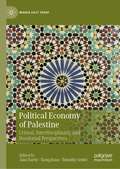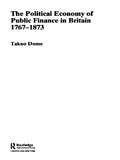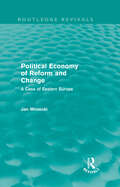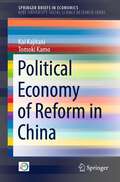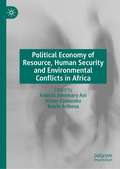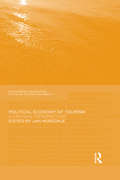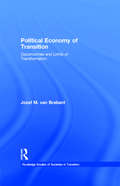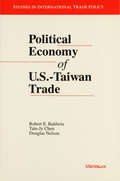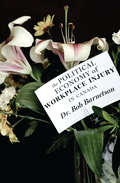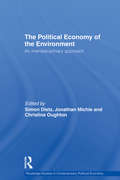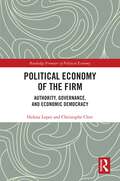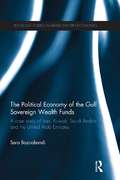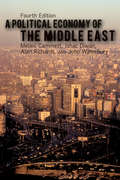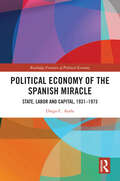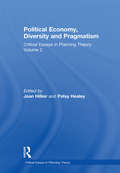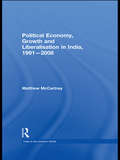- Table View
- List View
Political Economy of Institutions and Decisions: Above Politics
by Gary J. Miller Andrew B. WhitfordEconomic development requires secure contract enforcement and stable property rights. Normal majority-rule politics, such as bargaining over distributive and monetary policies, generate instability and frequently undermine economic development. Above Politics argues that bureaucracies can contribute to stability and economic development, but only if they are insulated from unstable politics. A separation-of-powers stalemate creates the conditions for bureaucratic autonomy. But what keeps delegated bureaucrats from being more abusive as they become more autonomous? One answer is the negotiation of long-term, cooperative relationships - that (when successful) typically bind subordinates to provide more effort in exchange for autonomy. Even more compelling is professionalism, which embeds its professional practitioners in professional norms and culture, and incidentally mitigates corruption. Financial examples are provided throughout the book, which ends with an analysis of the role played by professionalized bureaucracies during the Great Recession.
Political Economy of Institutions and Decisions: Marketing Sovereign Promises
by Cox Gary W.How did England, once a minor regional power, become a global hegemon between 1689 and 1815? Why, over the same period, did she become the world's first industrial nation? Gary W. Cox addresses these questions in Marketing Sovereign Promises. The book examines two central issues: the origins of the great taxing power of the modern state and how that power is made compatible with economic growth. Part I considers England's rise after the revolution of 1689, highlighting the establishment of annual budgets with shutdown reversions. This core reform effected a great increase in per capita tax extraction. Part II investigates the regional and global spread of British budgeting ideas. Cox argues that states grew only if they addressed a central credibility problem afflicting the Ancien R#65533;gime - that rulers were legally entitled to spend public revenue however they deemed fit.
Political Economy of Institutions and Decisions: The Military Origins of Urban Prosperity in Europe (Political Economy of Institutions and Decisions)
by Mark Dincecco Massimiliano Gaetano OnoratoThe economic rise of Europe over the past millennium represents a major human breakthrough. To explain this phenomenon, this book highlights a counterintuitive yet central feature of Europe's historical landscape: warfare. Historical warfare inflicted numerous costs on rural populations. Security was a traditional function of the city. To mitigate the high costs of conflict in the countryside, rural populations migrated to urban centers. Over time, the city's historical role as a safe harbor translated into local economic development through several channels, including urban political freedoms and human capital accumulation. To make this argument, the book performs a wide-ranging analysis of a novel quantitative database that spans more than one thousand years, from the fall of the Carolingian Empire to today. The book's study of urban Europe's historical path from warfare to wealth provides a new way to think about the process of long-run economic and political development.
Political Economy of Institutions, Democracy and Voting
by Norman Schofield Gonzalo CaballeroThis book presents the latest research in the field of Political Economy, dealing with the integration of economics and politics and the way institutions affect social decisions. The authors are eminent scholars from the U.S., Canada, Britain, Spain, Italy, Mexico and the Philippines. Many of them have been influenced by Nobel laureate Douglass North, who pioneered the new institutional social sciences, or by William H. Riker who contributed to the field of positive political theory. The book focuses on topics such as: case studies in institutional analysis; research on war and the formation of states; the analysis of corruption; new techniques for analyzing elections, involving game theory and empirical methods; comparing elections under plurality and proportional rule, and in developed and new democracies.
Political Economy of Macao since 1999
by Yufan Hao Li Sheng Guanjin PanThis book takes a comprehensive look at the governance and civil society of Macao, the shadowy mecca of gambling in Asia- and the reforms, changes, and social movements which are challenging that reputation today. Macao has experienced spectacular economic growth since it returned to Chinese rule in 1999. Following double-digit rates of economic growth between 2002 and 2013, Macao has become one of the wealthiest regions in Asia, with its GDP per capita rising from USD$14,258 in 2001 to USD$89,333 in 2014. Macao's prosperity over the past decade can be largely attributed to the government's decision to liberalize the casino industry in 2002 and the Chinese central government's facilitation of individual travel (FIT) scheme implemented in 2003. The casino industry has become the sole pillar of the local economy, overshadowing all other economic sectors. The increasing dependence on the casino industry has also made Macao's economy highly vulnerable and difficult to sustain. The authors lay out a comprehensive and well-argued case against the economic monoculture, in the process creating a book of profound interest to scholars of greater China, students of political economy, and travelers to the Macau.
Political Economy of Malaysia’s Industrial Policy: Institutional Capacity and the Automotive Industry (Springerbriefs In Political Science Ser.)
by Firdausi SuffianThis book examines the national automotive policy in Malaysia to help readers gain an understanding of the country’s industrial policy-making processes. Addressing a gap in analysis of the political economy of the national automotive policy, the research presented combines the new institutional theory and the developmental state approach to provide new insights into elite policymakers’ measures to shield domestic automotive enterprises from pro-market reforms. The formation of the national car project marks a turning point for Malaysia's industrial development as a country, which it envisions will lead to it becoming a major player in the global automotive market. However, the domestic institutional factors embedded in ethno-economic interests and patronage constrain national car-makers, limiting their potential to grow, and instead causing a slowdown in the industry.Allowing readers to understand the background to Malaysia’s heavy industrialisation programme and the birth of its national car projects, this book critically discusses the significance of institutional context in policy outcomes, and highlights how institutions and policies have impact growth or decline. It is a valuable resource relevant to analysts, researchers and students who are interested in the political economy of the national industrial policy and automotive industry in Malaysia and beyond.
Political Economy of Media Industries: Global Transformations and Challenges (Routledge Studies in Media and Cultural Industries)
by Randy Nichols Gabriela MartinezThis book provides a critical political economic examination of the impact of increasingly concentrated global media industries. It addresses different media and communication industries from around the globe, including film, television, music, journalism, telecommunication, and information industries. The authors use case studies to examine how changing methods of production and distribution are impacting a variety of issues including globalization, environmental devastation, and the shifting role of the State. This collection finds communication at a historical moment in which capitalist control of media and communication is the default status and, so, because of the increasing levels of concentration globally allows those in control to define the default ideological status. In turn, these concentrated media forces are deployed under the guise of entertainment but with a mind towards further concentration and control of the media apparatuses many times in convergence with others
Political Economy of New Pragmatism: Implications of Irreversible Globalization (Springer Studies in Alternative Economics)
by Grzegorz W. KolodkoThis book provides answers to fundamental questions of sustainable development and international cooperation in light of irreversible globalization. Based on comprehensive research and a wealth of experience from his own political activities, the author offers an insightful analysis of the globalized economy and its political, cultural and ecological context. Presenting an objective assessment, the author diagnoses the state of affairs and formulates recipes to overcome present day challenges, such as income inequalities, climate change, demographic imbalance and the new Cold War, which overlap with the “black trinity”: populism, nationalism and authoritarianism. "Grzegorz Kolodko is one of the most acute observers of the international economy, based on long experience both as a practitioner and as an academic. His writings are always an important starting point for debate and discussion about the political economy of globalization." Francis Fukuyama, Stanford University, author of “The End of History” "Grzegorz Kolodko unites deep policy experience, a vast breadth of observation and a solid grip on real-world economics in his case for a new pragmatism. For all involved in the causes of peace, justice, shared prosperity and public purpose, he is a leader and an ally." James K. Galbraith, The University of Texas at Austin "Dr. Kolodko delivers comprehensive and inspiring economic analysis, drawing on his rich historical political leadership. His probing and insightful assessment of globalization in today's and tomorrow's world is a must read." Rev. Jesse L. Jackson, President of Rainbow Coalition and International Civil Rights Activist
Political Economy of Palestine: Critical, Interdisciplinary, and Decolonial Perspectives (Middle East Today)
by Alaa Tartir Timothy Seidel Tariq DanaThis book explores the political economy of Palestine through critical, interdisciplinary, and decolonial perspectives, underscoring that an approach to economics that does not consider the political—a de-politicized economics—is inadequate to understanding the situation in occupied Palestine. A critical interdisciplinary approach to political economy challenges prevailing neoliberal logics and structures that reproduce racial capitalism, and explores how the political economy of occupied Palestine is shaped by processes of accumulation by exploitation and dispossession from both Israel and global business, as well as from Palestinian elites. A decolonial approach to Palestinian political economy foregrounds struggles against neoliberal and settler colonial policies and institutions, and aids in the de-fragmentation of Palestinian life, land, and political economy that the Oslo Accords perpetuated, but whose histories of de-development over all of Palestine can be traced back for over a century. The chapters in this book offer an in-depth contextualization of the Palestinian political economy, analyze the political economy of integration, fragmentation, and inequality, and explore and problematize multiple sectors and themes of political economy in the absence of sovereignty.
Political Economy of Public Finance in Britain, 1767-1873 (Routledge Studies In The History Of Economics Ser. #Vol. 66)
by Takuo DomeThe period between 1767 and 1873 shaped public finance in Britain (and, by extension, many other countries) as we know it today, with the major economists of the time providing influential contributions. Until now, no book has examined and compared the thought of these 'classical economists' from the perspective of public finance rather than that o
Political Economy of Reform and Change: A Case Of Eastern Europe (Routledge Revivals)
by Jan WinieckiFirst published in 1997, this collection of articles and essays analyses the political economy of reform and change in Eastern Europe during the years of Gorbachev’s perestroika and the years immediately following the fall of the Berlin wall and the collapse of the Soviet Union. Written by Polish economist Jan Winiecki, between 1984 and 1996, this work explores the issue of the feasibility of reform and change during the period of decline and collapse of communist economic order and, later, the emergence of the capitalist economic order in the post-communist Eastern Europe. Split into three parts, the work considers firstly the failures of Gorbachev’s political economy of reform, secondly the determining factors in the collapse of the Soviet system, and finally the feasibility of the systematic change which began in the wake of its collapse.
Political Economy of Reform in China (SpringerBriefs in Economics)
by Kai Kajitani Tomoki KamoThis book contains four research papers that clarify the issues behind China's rapid economic growth, using empirical studies. The book makes two distinctive points. First, it elucidates the unique economic development of China from a different perspective than the "state capitalism" theory, based on empirical research on the Chinese economy and politics with the cooperation of leading scholars. Second, the book paints a total picture of China through an interdisciplinary analysis of economics, politics, and history. Each chapter focuses on the political–economic context of China's rapid economic growth on the following basis. First, the authors analyze whether there is a clear difference in the labor distribution rate between state-owned and non-state-owned enterprises, using data from industrial enterprises. Second, they focus on Shenzhen as an innovation hub and examine sustainable innovation and its institutional context in China. Third, there is empirical clarification of questions by matching the databases of industrial enterprises and information on elected representatives of the Local People's Congress of Yangzhou City, Jiangsu Province. Finally, the authors focus on the competition by local governments to attract companies by auctioning land usage rights.
Political Economy of Resource, Human Security and Environmental Conflicts in Africa
by Kelechi Johnmary Ani Victor Ojakorotu Kelvin BribenaThis book shows the push and pull effects between resources, human security and conflicts in Africa. It recognizes the need for resources in Africa to be processed into finished goods in order to influence global market and redefine the pattern of trade relations with powerful countries of Asia, America and Europe in shaping the destiny and future of African countries. The achievement of this laudable objective is plagued by the security challenges which are directly or indirectly linked to resource-related conflicts rocking most of the resource endowed countries in the continent, thereby threatening global peace and security. To deal with this menace in the continent, it requires global co-operation and support of foreign governments, international organizations, international non-government organizations, governments of host countries and its citizens. The book presents the cases and experiences of countries that are endowed with resource, as well as have experienced different forms of human insecurity and have witnessed environmental conflicts in its analysis, which make the discourse interesting and quite educating.
Political Economy of Tourism: A Critical Perspective (Contemporary Geographies of Leisure, Tourism and Mobility)
by Jan MosedalePolitical economy, in its various guises and transfigurations, is a research philosophy that presents both social commentary and theoretical progress and is concerned with a number of different topics: politics, regulation and governance, production systems, social relations, inequality and development amongst many others. As a critical theory, political economy seeks to provide an understanding of societies – and of the structures and social relations that form them – in order to evoke social change toward more equitable conditions. Despite the early influence of critical development studies and political economy on tourism research, political economy has received relatively little attention in tourism research. Political Economy and Tourism the first volume to bring together different theoretical perspectives and discourse in political economy related to tourism. Written by leading scholars, the text is organised into three sequential Parts, linked by the principle that ‘the political’ and ‘the economic’ are intimately connected. Part one presents different approaches to political economy, including Marxist political economy, regulation, comparative political economy, commodity chain research and alternative political economies; Part two links key themes of political economy, such as class, gender, labour, development and consumption, to tourism; and Part three examines the political economy at various geographical scales and focuses on the outcomes and processes of the political act of planning and managing tourism production. This engaging volume provides insights and alternative critical perspectives on political economy theory to expand discussions of tourism development and policy in the future. Political Economy and Tourism is a valuable text for students, researchers and academics interested in Tourism and related disciplines.
Political Economy of Transition: Opportunities and Limits of Transformation (Routledge Studies of Societies in Transition #23)
by Jozef M. van BrabantThis book addresses the policy questions surrounding the challenge of transforming eastern European economies from their planned, administrative past to vibrant market-based entities. Jozef van Brabant considers in turn, the wider set of challenges facing these economies - stabilization, privatization, liberalization, institution building, and developing and maintaining the sociopolitical consensus - before examining the evolving role of the state. Using concrete examples from the eastern European countries throughout, including the Czech Republic and Bulgaria, this work systematically examines, in a society-wide context, the initial conditions of transformation, the policy tasks ahead and the manner in which policies have been pursued.
Political Economy of U.S. - Taiwan Trade (Studies In International Economics)
by Robert E. BaldwinTwo key features of the remarkable economic growth in the newly industrializing countries of East Asia over the last quarter of a century are the role of exports of manufactured goods as the engine of this growth and the importance of the United States as a market for these exports. Political Economy of U.S.-Taiwan Trade analyzes the nature of the political and economic interactions, both domestic and international, which evolved between Taiwan and the United States in a manner that has enabled this growth to occur. In analyzing the various cooperative and conflicting trade policies pursued by the two countries over the last fifty years, the authors utilize a broad political economy framework. They first describe the nature and evolution of trade between Taiwan and the United States and discuss the major economic and political groups and institutions that shape trade policies in the two countries. In doing so, the role that trade has played both in Taiwan's development policies and in the international economic and political policies of the United States in the post-World War II period is analyzed. The various restrictions imposed by each country on the other's exports are examined, and the efforts to reduce these trade barriers are then discussed in detail. Particular attention is given to the series of bilateral negotiations in which the United States has used its dominant economic and political power to force Taiwan to open a number of its internal markets. The book will be of interest to both economists and political scientists specializing in international economics and international political relations. Area specialists focusing on the Far East will also find the book helpful. Robert E. Baldwin is Hilldale Professor of Economics, University of Wisconsin. Tain-Jy Chen is Research Fellow, Chung-Hua Institution for Economic Research. Douglas Nelson is Associate Professor of Economics, Tulane University. This title was formally part of the Studies in International Trade Policy Series, now called Studies in International Economics.
Political Economy of Workplace Injury in Canada
by Bob BarnetsonWorkplace injuries are common, avoidable, and unacceptable. The Political Economy of Workplace Injury in Canada reveals how employers and governments engage in ineffective injury prevention efforts, intervening only when necessary to maintain the standard legitimacy. Dr. Bob Barnetson sheds light on this faulty system, highlighting the way in which employers create dangerous work environments yet pour billions of dollars into compensation and treatment. Examining this dynamic clarifies the way in which production costs are passed on to workers in the form of workplace injuries.
Political Economy of the Environment: An Interdisciplinary Approach (Routledge Studies In Contemporary Political Economy Ser.)
by Jonathan Michie Simon Dietz Christine OughtonThis book is the culmination of several years work by a group of academics, policy-makers and other professionals looking to understand how alternative economic thinking – and indeed thinking from quite different social-scientific disciplines – could enhance the mainstream economic approach to environmental and natural-resource problems. Of the editors, Dietz comes from the mainstream economics tradition, while Michie and Oughton draw explicitly on institutional and evolutionary economics. The various authors represent a range of disciplinary backgrounds and approaches. This book draws on the strengths of each and all of these approaches to analyse environmental issues and what can be done to tackle these through corporate and public policy. The book argues that the need for an inter-disciplinary approach. Two themes which emerge repeatedly throughout the book are the need for an interdisciplinary theory of technological change, and the need for a similarly interdisciplinary approach to the study of human behaviour and how it influences both production and consumption choices. The two themes are of course related. Resolving environmental questions requires an understanding of their nature, of their causes and, to the extent that they are anthropogenic, of how to change human behaviour. These fundamental issues are the focus of the four chapters that form Part 1 of this volume. The remainder of the volume develops them in more detail. .
Political Economy of the Firm: Authority, Governance, and Economic Democracy (Routledge Frontiers of Political Economy)
by Helena Lopes Christophe ClercAn alternative theory of the firm is needed that helps better understand the nature and actual functioning of firms as well as the challenges raised by digital platform firms. In defining firms as economic collective ventures organised by political means, this book offers a “political economy” vision of firms. Specifically, the book provides an authority-based conception of the firm that supplies a theoretical grounding for democratic governance. It is argued that workers must be viewed as actors of the firm, not passive subjects of capital, given that authority is a non-coercive form of power. The book examines authority and subordination from the workers’ perspective and argues that when workers accept authority, it is because they see it as facilitating mutually beneficial cooperation between people with divergent interests. As managerial authority is based on its acceptance by workers, it calls for legitimacy. Neither ownership nor the function that authority performs makes it legitimate. The book shows that legitimacy entails the democratisation of corporate governance, within the framework of “pluralistic companies”, and thus joins the many voices that increasingly question shareholder primacy. The book will be of great interest to researchers and students in economics and law as well as labour professionals, employers, unions, policymakers and anybody interested in economic democracy.
Political Economy of the Gulf Sovereign Wealth Funds: A Case Study of Iran, Kuwait, Saudi Arabia and the United Arab Emirates (Routledge Studies in Middle Eastern Economies)
by Sara BazoobandiUsing four Gulf sovereign wealth funds as case studies – Iran, Kuwait, Saudi Arabia and the UAE - this book examines and analyses the history, governance and structure, and investment strategies of the above mentioned funds, in the context of on-going debates about their transparency. The book discusses how most Gulf sovereign wealth funds were established under colonial rule, and have operated in the global financial system for many decades. With the increase of oil revenues, it goes on to look at how the funds have broadened their asset classes and their institutional development. Debate over the transparency of sovereign wealth funds has highlighted various global practices. Recently, organisational measures have been introduced for calculating possible risks from non-commercial investment incentives of funds, whose politically-driven investment strategies are viewed as potentially a major threat to the national security of their host countries. Highlighting a number of incidents that triggered the transparency debate, the book scrutinises the reaction of some of the Gulf sovereign wealth funds to these recent regulatory codes and strategies. It is a useful contribution to Development, Political Economy and Middle East Studies.
Political Economy of the Middle East
by John Waterbury Alan Richards Melani Cammett Ishac DiwanA Political Economy of the Middle East is the most comprehensive analysis of the political economy of development in the contemporary Middle East over the past several decades, examining the interaction of economic development processes, state systems, state policies, and social actors in the Middle East. The fourth edition, with new authors Melani Cammett and Ishac Diwan, has been thoroughly revised, with two new introductory chapters that provide an updated framework with which to understand and study the many changes in demography, education, labor markets, urbanization, water and agriculture, and international labor migration in the recent years. The new edition also includes: a new chapter that charts the political economy of the Gulf states and in particular the phenomenal growth of oil economies; a new chapter on the growth of the private sector and its effects in the region; a new chapter on the rise of "crony capitalism;" and increased coverage of the changes in civil society and social movements in the region including an exploration of the causes, dynamics, consequences, and aftermath of the Arab uprisings.
Political Economy of the Middle East
by John Waterbury Alan Richards Melani Cammett Ishac DiwanA Political Economy of the Middle East is the most comprehensive analysis of the political economy of development in the contemporary Middle East over the past several decades, examining the interaction of economic development processes, state systems, state policies, and social actors in the Middle East. The fourth edition, with new authors Melani Cammett and Ishac Diwan, has been thoroughly revised, with two new introductory chapters that provide an updated framework with which to understand and study the many changes in demography, education, labor markets, urbanization, water and agriculture, and international labor migration in the recent years. The new edition also includes: a new chapter that charts the political economy of the Gulf states and in particular the phenomenal growth of oil economies; a new chapter on the growth of the private sector and its effects in the region; a new chapter on the rise of "crony capitalism;" and increased coverage of the changes in civil society and social movements in the region including an exploration of the causes, dynamics, consequences, and aftermath of the Arab uprisings.
Political Economy of the Spanish Miracle: State, Labor and Capital, 1931-1973 (Routledge Frontiers of Political Economy)
by Diego AyalaIn the 1950s and 1960s, Spain underwent one of the most rapid processes of economic development the world had ever seen. Most existing analyses of this process explain the “Spanish Miracle” as a product of the unleashing of market forces and of changes in economic policy made by the Franco regime in the 1950s. Political Economy of the Spanish Miracle provides an alternative explanation of Spanish economic development, analyzing the Miracle from an interdisciplinary political economy perspective that treats capitalist growth as a complex and dynamic interaction between capitalists, workers and the state. The Spanish Miracle is linked to changes in Spanish society produced by the Spanish Civil War, to the class structure of the regime brought to power by that Civil War and to the interaction between domestic social struggles under the Franco regime and Spain’s insertion into the international political economy of the Cold War capitalist world. Ambitious in scope, Political Economy of the Spanish Miracle both revises conventional understandings of Spanish economic growth and situates Spain within comparative discussions of development in the twentieth century. This book will be of great interest to readers in political economy, economic sociology, historical sociology and Spanish and European history more broadly.
Political Economy, Diversity and Pragmatism: Critical Essays in Planning Theory: Volume 2 (Critical Essays in Planning Theory)
by Patsy HealeyPlanning Theory has a history of common debates about ideas and practices and is rooted in a critical concern for the 'improvement' of human and environmental well-being, particularly as pursued through interventions which seek to shape environmental conditions and place qualities. The second volume in this series covers in detail critical political economy, the turn to diversity and critical pragmatism. It provides an authoritative collection, in an accessible form, of the most important and influential articles and papers along with a detailed introduction by the editors. It offers a unique reference resource for planning scholars, upper-level undergraduate and post-graduate students.
Political Economy, Growth and Liberalisation in India, 1991-2008 (India in the Modern World)
by Matthew McCartneyThe phenomenal growth and liberalisation of the Indian economy has been the subject of extensive scholarly documentation and competing interpretations. This book examines the key period of liberalisation in India from 1991 to 2008. It analyses the relationship between growth and liberalisation and, in particular, the recent ‘miracle growth rate’ and considers its sustainability in the current Indian economic environment. The book explores and re-evaluates the historical experience of planning in India between 1950 and 1980 as an alternative model of state-led economic development, discusses how far current rapid growth is the result of liberalisation, and how strong the case is for continued liberalisation today. The book is a significant contribution to the growing debate on economic growth and liberalisation, and the broader subject of economic development in India and other developing countries. It will appeal to students, researchers, lecturers and all those interested in South Asia in general and, India, in particular. It is also an essential resource for the study of international political economy and development economics.

